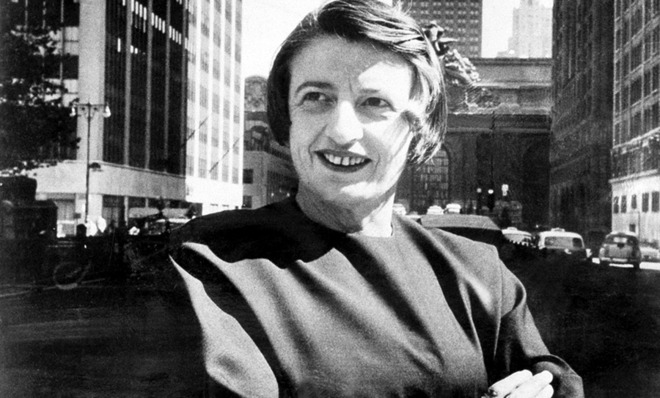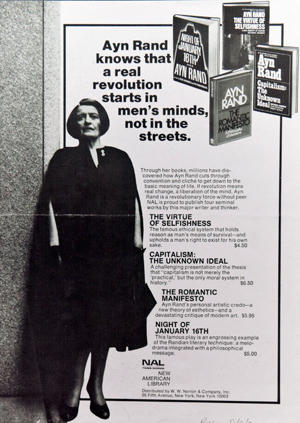I hate Ayn Rand — but here's why my fellow conservatives love her
And no, liberals: It's not because they're greedy jerks who loathe the poor


A free daily email with the biggest news stories of the day – and the best features from TheWeek.com
You are now subscribed
Your newsletter sign-up was successful
Many of my fellow conservatives love Ayn Rand. And many of my liberal friends love to hate her.
You can understand why progressives enjoy blasting Rand's presumably nefarious influence on the conservative movement. She makes for a convenient punching bag for progressives, because she embodies the caricatured version of what progressives imagine conservatives really think: that egotism and greed are good and that the parasitic weak deserve to be trod upon by the capitalistic powerful.
And then there are people like me: Conservatives who view themselves as Christians first. To us, Rand's worldview is repellent, and the fact that her works are so widespread on the right is beyond annoying.
The Week
Escape your echo chamber. Get the facts behind the news, plus analysis from multiple perspectives.

Sign up for The Week's Free Newsletters
From our morning news briefing to a weekly Good News Newsletter, get the best of The Week delivered directly to your inbox.
From our morning news briefing to a weekly Good News Newsletter, get the best of The Week delivered directly to your inbox.
I hate nearly everything Rand stands for. I find her prose unbearable. But I also, unlike Rand, believe in the virtue of empathy, and have decided to apply it to people who like her work. To that end, here are a few different perspectives on why so many conservatives like Ayn Rand.
1. It's a wish-fulfillment fantasy
In Ayn Rand's books, the main character is typically an implausibly awesome version of the person many conservatives would secretly like to be. Wish-fulfillment fantasies exert a powerful influence on us. There is something in our souls that tells us that we are inadequate, that reminds us of our many failures and the ways the world fails to appreciate our precious gifts. Works of fiction in which the main character unleashes our fantasies touches something deep.
For me as a geeky, bullied preteen, Ender's Game fulfilled this need. Here was a book about a supersmart, supertalented kid who is recognized for it, whose skills are groomed and appreciated, and who eventually goes on to save the world. (Dune was also great for that.) Even now, as I find all sorts of inadequacies with the Ender books, I can't help but retain a deep fondness for them, and will probably recommend them to my teenage kids.
A free daily email with the biggest news stories of the day – and the best features from TheWeek.com
Ayn Rand's fantasy stories work the same way for young conservatives. A figure like John Galt reaches into deep places inside yourself, and produces intense feelings.
This type of fiction is the ice cream of art: Harmless enough if we don't mistake it for a nutritious meal but, if we're honest with ourselves, we probably recognize that we're a bit too attracted to it. And remember, there's almost certainly a piece of schlock that does for you the same things that Atlas Shrugged does for many conservatives, so cut them some slack.
2. It's possible to dissociate a book from its politics
According to my totally nonscientific sense of things, the singlemost popular work of fiction among Silicon Valley geeks is The Lord of the Rings. (And even if it's not the MOST popular, it's still undeniably popular.) Much has been written about the techno-utopianism of Silicon Valley culture. But Lord of the Rings is profoundly and explicitly anti-technology; Tolkien clearly associates the forces of evil with industrial modernity, and his picture of Eden, whether the Hobbits' Shire or the Elven realms, is pre-technological. Peter Thiel, who may be the most techno-utopian futuristic billionaire in Silicon Valley, has also named not one, not two, but three companies after items or characters from Lord of the Rings. How does he reconcile these contradictions?!?!?!?!?!
It's probably very easy for him, because you don't have to love a piece of art's politics to love the piece of art itself.
In the case of conservatives and Ayn Rand, then, if you combine this with point one, a narrative falls into place: A young conservative finds an Ayn Rand book; because it is a wish-fulfillment fantasy, it exerts a powerful pull on her and she starts to love it, perhaps a bit too much; as the conservative grows up and reads more (and better) conservative books, her politics hopefully separate a bit from Rand's extreme and insane Objectivism, even as she retains a great fondness for the books.
3. There are too few works of art in popular culture that have conservative values

Progressives often obsess over the notion of "checking your privilege," and I believe by and large it is a healthy instinct, because many of us are indeed beneficiaries of privilege. But here's one type of privilege I wish progressives would check: The privilege of growing up in a world where the vast majority of culture, both high and low, reflects your worldview.
I was amused when the blogosphere collapsed in a heap of disbelieving LOLs when it was revealed that Paul Ryan (also frequently indicted for his love of Ayn Rand) loves the band Rage Against the Machine. I too love RATM. Tom Morello is a musical genius, and Zack de la Rocha indisputably has a gift from God.
To grow up as a conservative with an omnivorous yet discerning aesthetic palate is to get a never-ending, and I mean never-ending, education in the sometimes-difficult process of appreciating works whose political (if not metaphysical) worldview is deeply at odds with your own. This is an education that progressives (especially if they don't study the classical liberal arts) by and large don't get.
I think the shock that so many progressives experience when they find out a conservative can love RATM and, conversely, the implicit notion that if someone likes Ayn Rand that automatically makes them a Randbot, is due to this form of privilege. There remains a deep strain in left-wing aesthetics of judging a work's value by the politics it promotes. (Case in point: the Academy Awards.)
This dearth of conservative values in popular culture, then, doesn't just mean that conservatives will latch onto comparatively inferior cultural works that reflect their worldview, although it surely plays a role. But even as a conservative's politics deviate from Rand's, she will be more able to maintain her enjoyment of Rand's works, to an extent that may seem inexplicable to a progressive.
4. Rand's work does get at a crucial truth that almost everyone misses
Again, as a Christian and as a conservative, I find Rand's Objectivism, to use a word she so liked, despicable. But I still must recognize that Rand's work emphasizes one crucial truth about the world that almost nobody else does: Free enterprise is key to human flourishing, not just because it enables the most material prosperity, but because it encourages human creativity.
Most defenses of free market capitalism are typically made in a utilitarian lens; partly because it's such an easy case to make and partly because that is the lens of most academic work in economics. And it is most certainly true that, yes, with some important caveats, the freer the markets, the more prosperous the polity.
But that is not the whole truth. The whole truth takes into account that part of our human nature is a deep drive to find meaning through work, productivity, and even creativity, and that the free enterprise system enables this. That makes free enterprise morally, not just empirically, superior. From the Etsy merchant and the blogger to Bill Gates and Jeff Bezos, the free enterprise system, more than any other system that has ever been tried, enables people to express their creativity and flourish by producing work that other people want and makes their lives better.
This means that, much like democracy, capitalism is a deeply morally righteous system.
This discourse is almost never heard in contemporary society, certainly not in the realm of culture. And yet, for all its many shortcomings, it is found in 500-proof form in the works of Ayn Rand. And I think this is a key reason why so many experience her books as a revelation, despite all their shortcomings.
Pascal-Emmanuel Gobry is a writer and fellow at the Ethics and Public Policy Center. His writing has appeared at Forbes, The Atlantic, First Things, Commentary Magazine, The Daily Beast, The Federalist, Quartz, and other places. He lives in Paris with his beloved wife and daughter.
-
 How to juggle saving and paying off debt
How to juggle saving and paying off debtthe explainer Putting money aside while also considering what you owe to others can be a tricky balancing act
-
 Hong Kong jails democracy advocate Jimmy Lai
Hong Kong jails democracy advocate Jimmy LaiSpeed Read The former media tycoon was sentenced to 20 years in prison
-
 Japan’s Takaichi cements power with snap election win
Japan’s Takaichi cements power with snap election winSpeed Read President Donald Trump congratulated the conservative prime minister
-
 The billionaires’ wealth tax: a catastrophe for California?
The billionaires’ wealth tax: a catastrophe for California?Talking Point Peter Thiel and Larry Page preparing to change state residency
-
 Bari Weiss’ ‘60 Minutes’ scandal is about more than one report
Bari Weiss’ ‘60 Minutes’ scandal is about more than one reportIN THE SPOTLIGHT By blocking an approved segment on a controversial prison holding US deportees in El Salvador, the editor-in-chief of CBS News has become the main story
-
 Has Zohran Mamdani shown the Democrats how to win again?
Has Zohran Mamdani shown the Democrats how to win again?Today’s Big Question New York City mayoral election touted as victory for left-wing populists but moderate centrist wins elsewhere present more complex path for Democratic Party
-
 Millions turn out for anti-Trump ‘No Kings’ rallies
Millions turn out for anti-Trump ‘No Kings’ ralliesSpeed Read An estimated 7 million people participated, 2 million more than at the first ‘No Kings’ protest in June
-
 Ghislaine Maxwell: angling for a Trump pardon
Ghislaine Maxwell: angling for a Trump pardonTalking Point Convicted sex trafficker's testimony could shed new light on president's links to Jeffrey Epstein
-
 The last words and final moments of 40 presidents
The last words and final moments of 40 presidentsThe Explainer Some are eloquent quotes worthy of the holders of the highest office in the nation, and others... aren't
-
 The JFK files: the truth at last?
The JFK files: the truth at last?In The Spotlight More than 64,000 previously classified documents relating the 1963 assassination of John F. Kennedy have been released by the Trump administration
-
 'Seriously, not literally': how should the world take Donald Trump?
'Seriously, not literally': how should the world take Donald Trump?Today's big question White House rhetoric and reality look likely to become increasingly blurred
